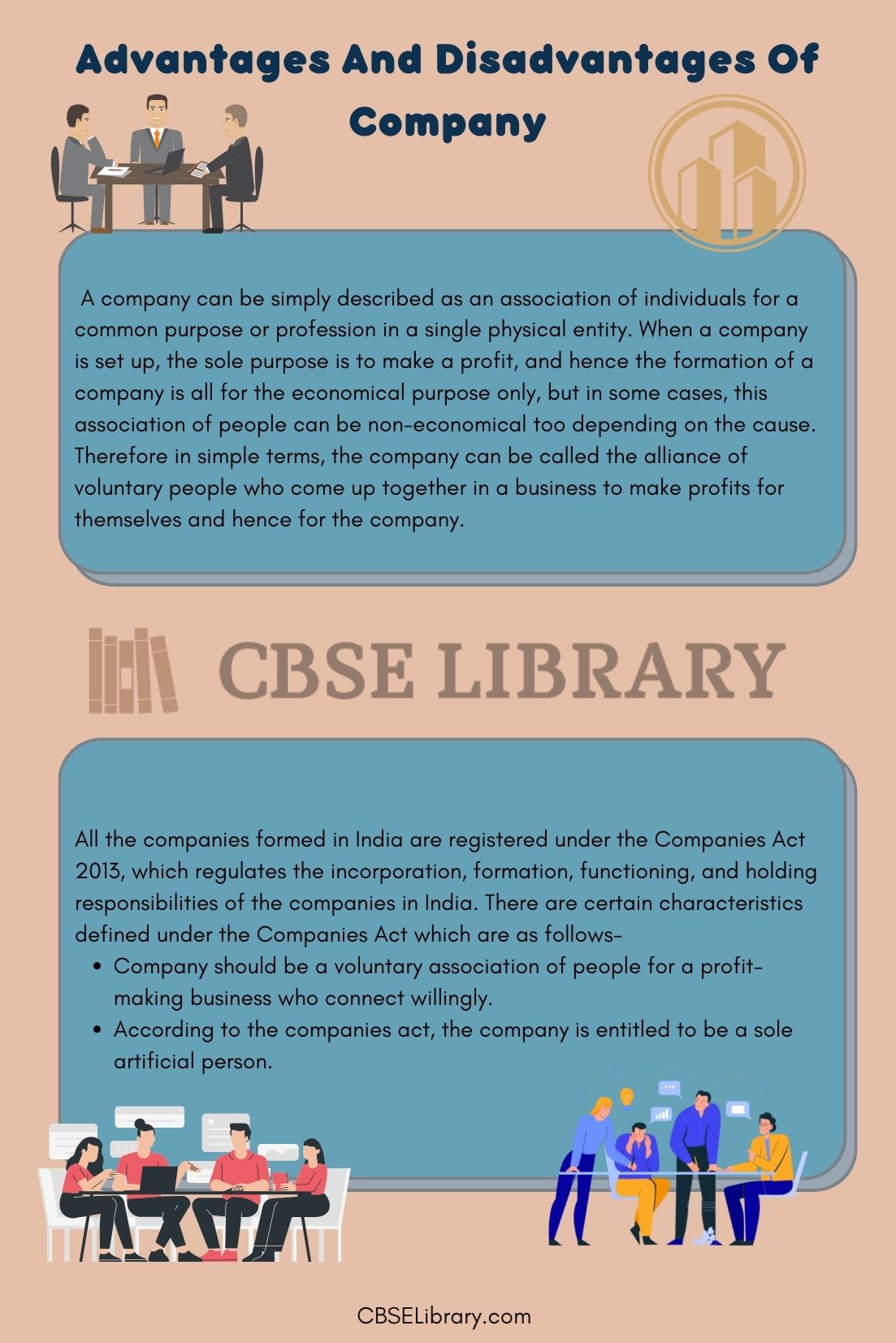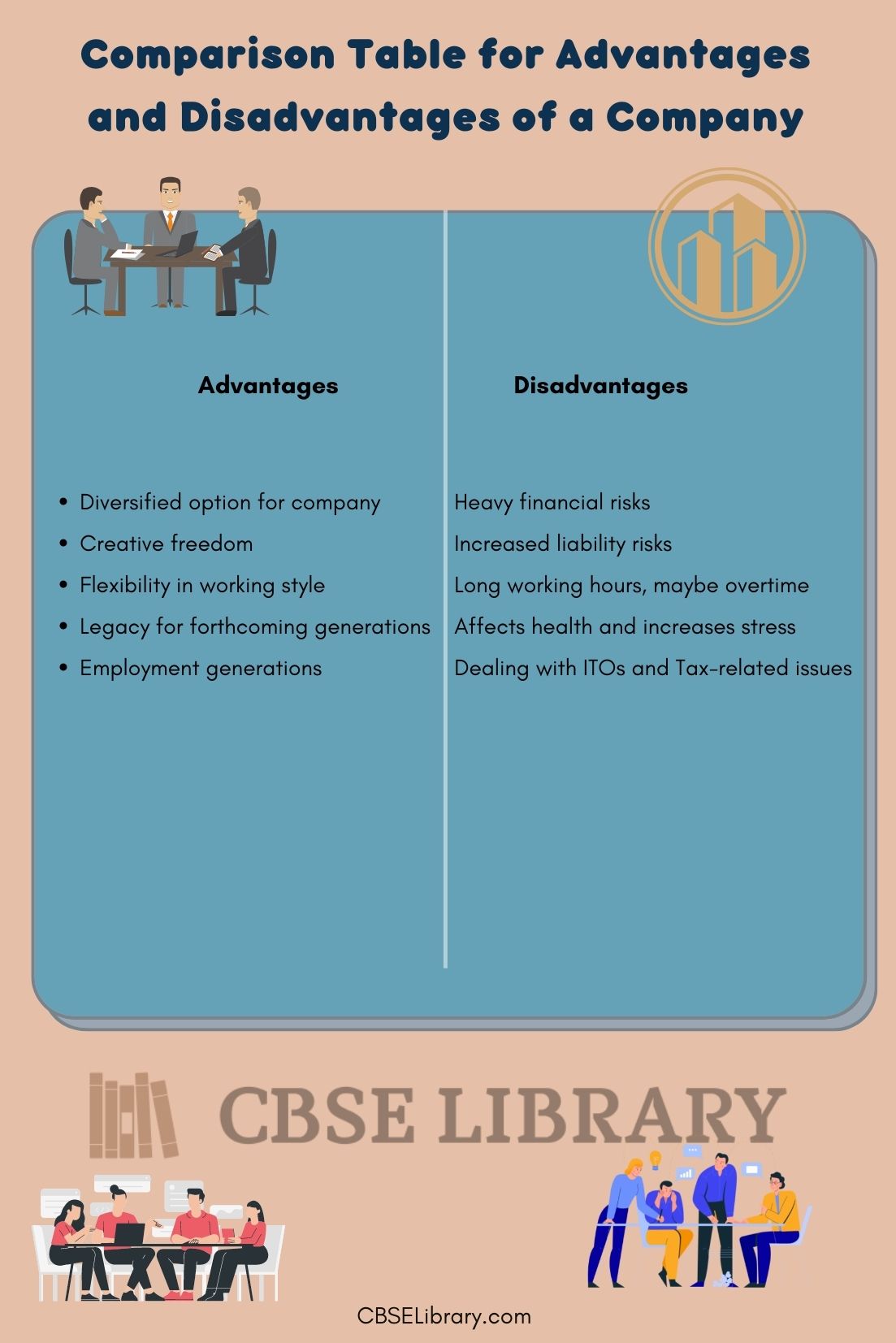Advantages And Disadvantages Of Company: A company can be simply described as an association of individuals for a common purpose or profession in a single physical entity. When a company is set up, the sole purpose is to make a profit, and hence the formation of a company is all for the economical purpose only, but in some cases, this association of people can be non-economical too depending on the cause. Therefore in simple terms, the company can be called the alliance of voluntary people who come up together in a business to make profits for themselves and hence for the company.
Students can also find more Advantages and Disadvantages articles on events, persons, sports, technology, and many more.
What is a Company? Advantages and Disadvantages of a Company
A company, in business terms, is a legal identity that is formed by the association of people who joins a particular entity and work the raise the business to make profits. This company can be industrial or commercial and in all cases are eligible to pay taxes to the government of India, however, the size and type of business determine the tax slabs for them. The business that the company is going to enter in and the chances of profit maximization determine the type of company it will be. There are broadly 5 types of company structures-
- Sole Proprietorship
- Partnership
- Corporation
- Limited Liability Company
- Cooperative
We will discuss all 5 types of companies in detail below.
- Advantages of a Company
- Disadvantages of a Company
- Comparison Table for Advantages and Disadvantages of a Company
- FAQ’s on Advantages And Disadvantages Of Company
Types of Companies
Once the business idea is ready the company is all set to have its form and ownership. There are five types of companies. Let’s discuss them one by one,
Sole Proprietorship: Sole proprietorship of a company means that the company is going to have a single owner and there are no distinctions between the company and its owners. The sole proprietorship format can be seen broadly in the small businesses that do not make huge turnovers per year. Since they have low initial costs and pay less tax as per the government guidelines, it does not require more than one head to run the company.
Partnership: Having a partner in companies is a trend where the company has two or more individuals who become the owner of a company by formally agreeing on a contract. In fact, partners aren’t necessary to be human beings, as the partnership can also be established between two different business entities too. The agreement of partnership constitutes of the authoritative level, profit, and loss sharing clauses and assets and liabilities clauses. It is advisable to choose the partners wisely as the decisions of partners in the company affect the entire working system.
Corporations: Company, as an entity can also act as the owner in it and corporations, are the examples of it. Corporations are businesses and they have all rights reserved to run as a sole entity. Companies, turned corporations have all the paperwork and other leisure that any individual can enjoy. It has its own assets, can hire employees, and also pay taxes for its existence too. However, at the higher level, the corporations are also headed by the government of the state and the BOD appointed by it.
Limited liability companies: Limited liability firms, like corporations, separate the liabilities of the owners from that of the company. They can be taxed as corporations or partnerships, and they can be held by a variety of business organizations, including trusts, corporations, people, and other limited liability companies.
Corporations: Corporations are the type of businesses that provides benefits to the owners who use their services. In simple words, the company divides all of its earnings among its owners and members. Such corporations have heads such as BOD and they make necessary changes and decisions concerning the company.
Characteristics of a Company
All the companies formed in India are registered under the Companies Act 2013, which regulates the incorporation, formation, functioning, and holding responsibilities of the companies in India. There are certain characteristics defined under the Companies Act which are as follows-
- Company should be a voluntary association of people for a profit-making business who connect willingly.
- According to the companies act, the company is entitled to be a sole artificial person.
- Although the law allows the company to hold the title of an individual, it is not a citizen, but it can only act as a person.
- A company’s liabilities can be limited by the shares.
- The company can be demolished after valid legal paperwork. The death of the owner cannot decide the demolition of the company.

Advantages of a Company
- It has Limited Financial Resources: A company can have a huge capital if a large number of people invest even a small amount of contributions. In fact in public companies, the shares are open to the general citizens and involve deposits from people. In a turn of these investments, the company issues the debentures to raise the funds.
- Professional Management: There is a crystal clear selection of the head of the company. He/she is called a director. The selected head has sound expertise in their respective domains and hence provided the departments to handle accordingly. Also, a board is established which includes the heads of different departments. These boards of directors are elected by the members of the shareholder of the company.
- Large-Scale Production: The club of the above two raises the benefits in the production of the company, hence the results. This means if a company has more than the required funds and the best board of directors to handle that fund easily, then the company can enjoy the large-scale production, maybe at lower costs.
- Contribution to Society: As the company rises, it naturally tends to expand. Expansions require more workforce to perform the work more efficiently and smoothly. Therefore a company provides a contribution to society by generating employment.
- Research and Development: Research and development and training and development are keys to any successful organization. The strong R&D is in the company, the more it will help the company to mark its position in the market, and training and development of the staff enhance their working style, hence benefits the company.
Disadvantages of a Company
- Difficulty in Establishment: According to the companies act 2013, any company in India needs to follow the set of legal procedures to register their company which is a very hectic process and takes sometimes years. Also establishing a company needs to have a secretary and chartered accountant for sure, hence the initial cost of the company is very high and creates difficulty in its establishment.
- Delayed Policy Decisions: To apply any decision taken by the board members in the company has to follow certain legal formalities. These formalities take a lot of time and delay policy-related decisions.
- Power and Authority are Limited: Once the company is established and starts to expand, the complete power of the company is still in one hand, the owner. Therefore, at some point in time, the owner may misuse the powers or even make decisions that aren’t acceptable to the shareholders and the board.
- Extreme Government Interventions: Public companies, especially the joint-stock companies are under the direct control of the government by law. In such cases, the decisions made by the government have to be implemented by the companies, which certainly disturbs the working style of the company as it is abide by the rules and regulations of GOI.
Comparison Table for Advantages and Disadvantages of a Company
| Advantages | Disadvantages |
| Diversified option for company | Heavy financial risks |
| Creative freedom | Increased liability risks |
| Flexibility in working style | Long working hours, maybe overtime |
| Legacy for forthcoming generations | Affects health and increases stress |
| Employment generations | Dealing with ITOs and Tax-related issues |

FAQ’s on Advantages And Disadvantages Of Company
Question 1.
What is the literal meaning of a company?
Answer:
The term Company has its origin in a French term- ‘Compagnie’ which means society & friendship.
Question 2.
Can the company enjoy the fundamental rights of India?
Answer:
A company cannot have any fundamental right of India, as it has been given the status of a legal person by GOI, still, it is not any citizen of India.
Question 3.
What is the difference between a company and a corporate?
Answer:
A company is a nomenclature that defines the business at a small scale. Whereas, the corporate work at a large scale, and its owners are widely the shareholders of the corporate.
